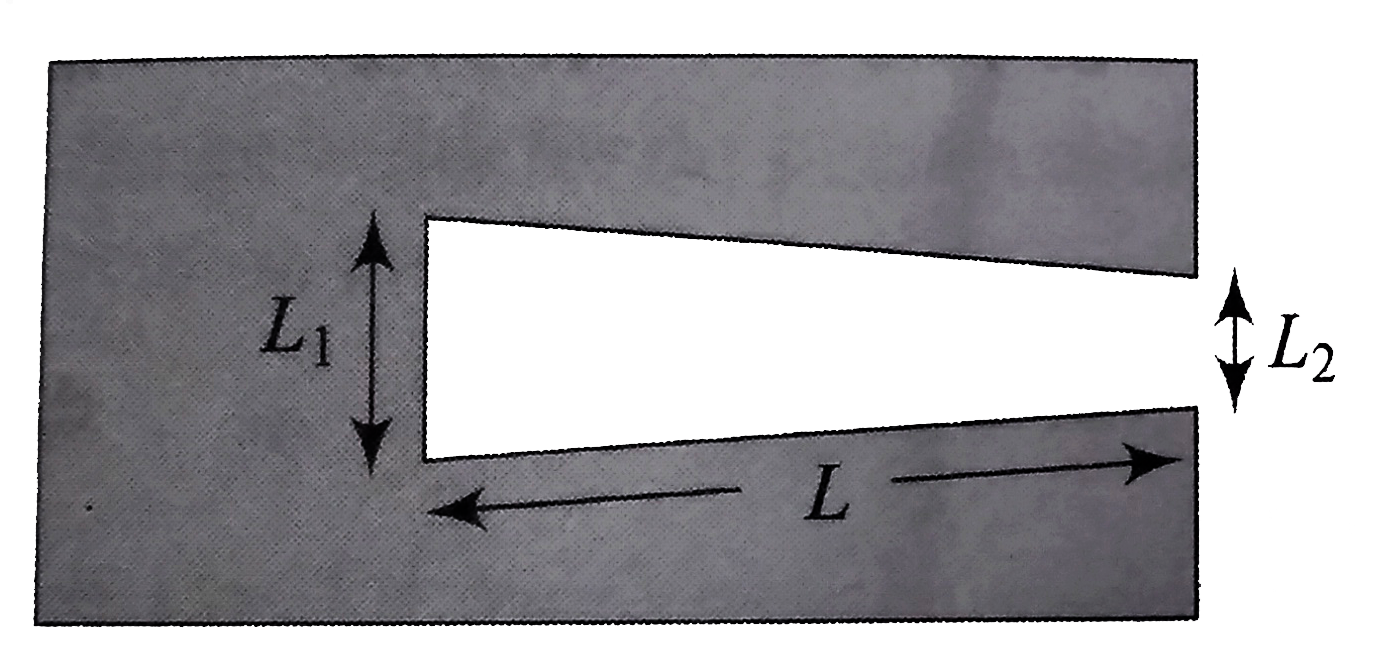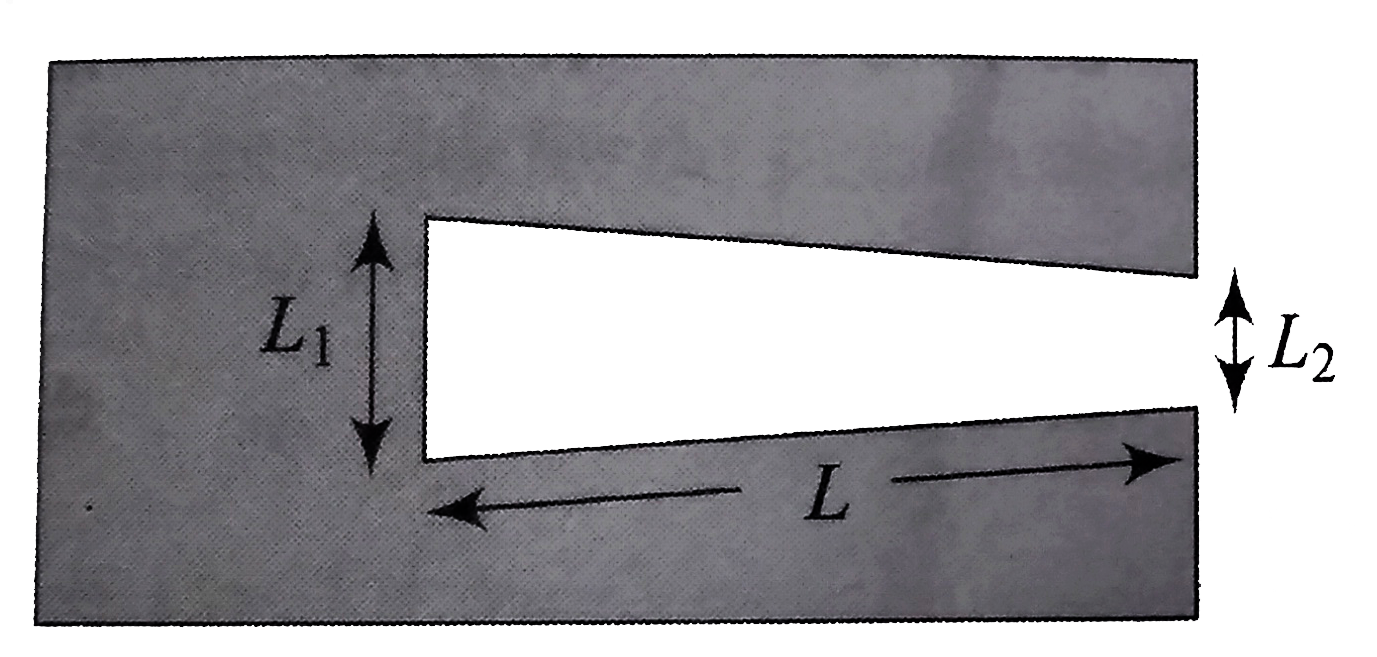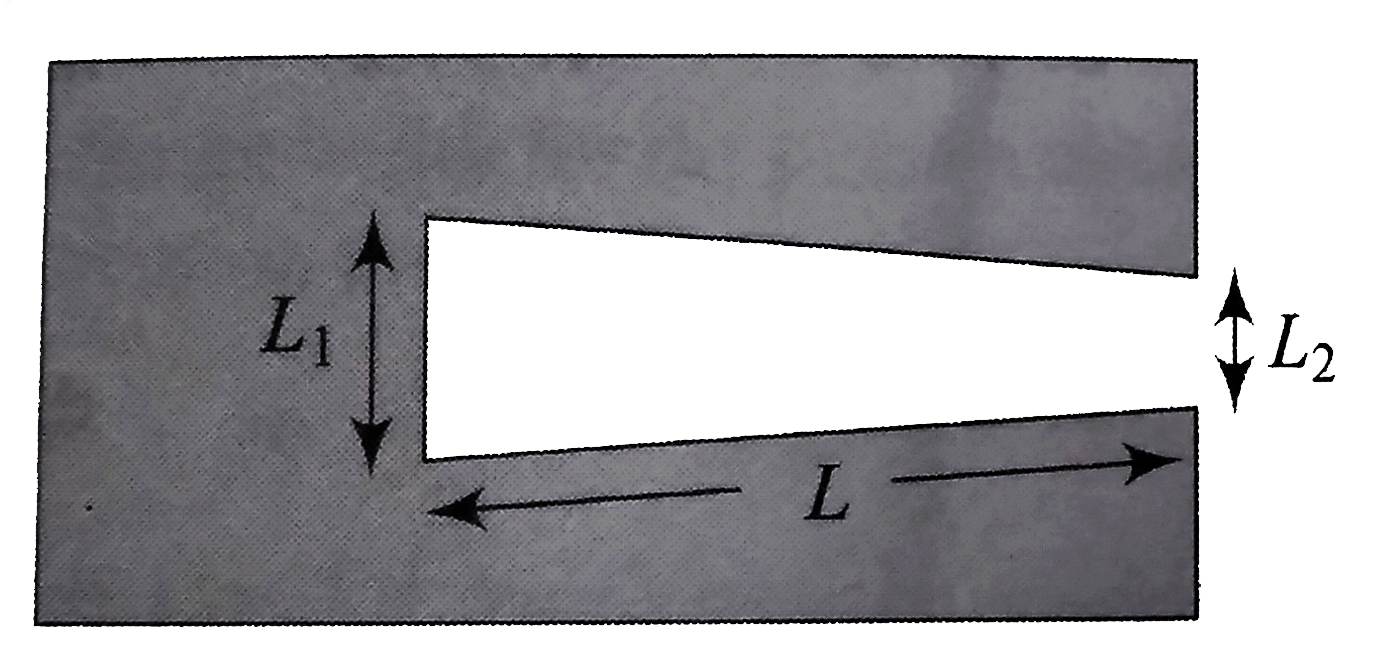A block o plastic having a thin air cavity (whose thickenss is comparable to wavelength of light waves) is shown in fig. The thickness of air cavity (which can be considered as air wedge for interference pattern) is varying linearly from one end to other as shown.
A broad beam of monochromatic light is incident normally from the top of the plastic box. Some ligth lis reflected back above and below the cavity .The plastic layers than wavelength of incident light . An observer when looking down from top sees an interference pattern consisting of eight dark fringes and seven bright fringe along the wedge. Take wavelength of incident light in air as λ0 and refractive index of plastic as μ
Assume that the thickness of the ends of air cavity are such that formation of fringe takes place there.

Determine the distance of 4th dark fringe from the left end of air cavity.
2L6+λ0
L1+3L4
4L7
5L7
The correct Answer is:c
For 4th dark fringe from left end,
2μt=(n−3)λ0
2μ(L2+L1−L2Lx)=2μL1−3λ0
x=4L7
Topper's Solved these Questions
- WAVE OPTICSBOOK - CENGAGE PHYSICS ENGLISHCHAPTER - WAVE OPTICSEXERCISE - Integer
3 Videos
- WAVE OPTICSBOOK - CENGAGE PHYSICS ENGLISHCHAPTER - WAVE OPTICSEXERCISE - Archives
4 Videos
- WAVE OPTICSBOOK - CENGAGE PHYSICS ENGLISHCHAPTER - WAVE OPTICSEXERCISE - Assertion- Reasoning
13 Videos
- SOURCES OF MAGNETIC FIELDBOOK - CENGAGE PHYSICS ENGLISHCHAPTER - SOURCES OF MAGNETIC FIELDEXERCISE - single correct Ansewer type
12 Videos
Similar Questions
A block o plastic having a thin air cavity (whose thickenss is comparable to wavelength of light waves) is shown in fig. The thickness of air cavity (which can be considered as air wedge for interference pattern) is varying linearly from one end to other as shown.
A broad beam of monochromatic light is incident normally from the top of the plastic box. Some ligth lis reflected back above and below the cavity .The plastic layers than wavelength of incident light . An observer when looking down from top sees an interference pattern consisting of eight dark fringes and seven bright fringe along the wedge. Take wavelength of incident light in air as λ0 and refractive index of plastic as μ
Assume that the thickness of the ends of air cavity are such that formation of fringe takes place there.

Determine the separation between 1st and 2nd dark fringes form the left end of air cavity
View SolutionA block o plastic having a thin air cavity (whose thickenss is comparable to wavelength of light waves) is shown in fig. The thickness of air cavity (which can be considered as air wedge for interference pattern) is varying linearly from one end to other as shown.
A broad beam of monochromatic light is incident normally from the top of the plastic box. Some ligth lis reflected back above and below the cavity .The plastic layers than wavelength of incident light . An observer when looking down from top sees an interference pattern consisting of eight dark fringes and seven bright fringe along the wedge. Take wavelength of incident light in air as λ0 and refractive index of plastic as μ
Assume that the thickness of the ends of air cavity are such that formation of fringe takes place there.

Determine of difference L1−L2=ΔL) in terms of λ0.
View Solution
Knowledge Check
A beam of monochromatic light entering a glass window pane from the air will experience a change in
Afrequency nad wavelengthBfrequency and speedCspeed and wavelengthDspeed only
A ray of monochromatic light is incident from air on a glass slab.
Name the two rays that are parallel to each other.
View SolutionA ray of monochromatic light is incident from air on a glass slab.
Mark the lateral displacement in your diagram.
View SolutionLong bones with air cavities occur in
View SolutionA beam of monochromatic light is refracted from vacuum into a medium of refractive index 1.5 The wavelength of refracted light will be
View SolutionMonochromatic light is refracted from air into the glass of refractive index μ . The ratio of the wavelength of incident and refracted waves is
View SolutionMonochromatic light passes through prism. Compared to that in air. Inside the prism the light's
View SolutionRed light of wavelength 6400 Å in air has a wavelength of 4000 Å in glass. If the wavelength of violet light in air is 4400 Å, then the wavelength in glass is
View Solution
